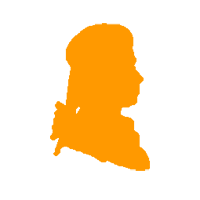Pierre Passereau (c. 1509 – 1547) was a French
composer of the Renaissance. Along with Clément
Janequin, he was one of the most popular composers of
"Parisian" chansons in France in the 1530s. His output
consisted almost exclusively of chansons; most of them
were published by printer Pierre Attaingnant. Most of
them were "rustic" in character, similar to patter
songs, using onomatopoeia, double entendres, and
frequent obscenity, a common feature of popular music
in France and the Low Countrie...(+)
Pierre Passereau (c. 1509 – 1547) was a French
composer of the Renaissance. Along with Clément
Janequin, he was one of the most popular composers of
"Parisian" chansons in France in the 1530s. His output
consisted almost exclusively of chansons; most of them
were published by printer Pierre Attaingnant. Most of
them were "rustic" in character, similar to patter
songs, using onomatopoeia, double entendres, and
frequent obscenity, a common feature of popular music
in France and the Low Countries in the 1530s.
Some details of Passereau's life have been compiled by
scholars, including pioneering 19th-century
musicologist François-Joseph Fétis in his enormous
Biographie universelle des musiciens (1834). Passereau
first appears in the historical record as a tenor
singer in the chapel of the Count of Angoulême (who
was later to become King Francis I); therefore he was
already an adult, and born before about 1495. He had
some association with both Bourges Cathedral and
Cambrai Cathedral, as he appears in the records of both
places, and is documented as being a singer at Cambrai
between 1525 and 1530. He may also have been a priest
at the church of Saint Jacques-de-la-Boucherie in
Paris, although this statement by Fétis has not been
independently confirmed.
Almost everything Passereau wrote, or everything that
has survived, are chansons. Since details of his
biography are spotty, it is difficult to determine how
much lost work there may be. He is known to have
written one sacred composition, a motet, Unde veniet
auxilium michi (the text is from Psalm 120, and used in
the Office of the Dead).
Passereau's chansons are mostly light-hearted affairs,
similar in content to the Italian frottola, although no
direct influence from the earlier popular Italian form
has been reliably demonstrated. He liked to use
nonsense syllables, often in imitation of animals, as
in Il est bel et bon, his most popular piece, which
imitates the clucking of chickens. This composition was
sung as far away as Venice. While Passereau may have
gotten the idea from Janequin, who was writing
onomatopoeic chansons as early as 1515 (Il est bel et
bon was published in 1534), its popularity rivaled that
of the music of Janequin, and printer Pierre
Attaingnant devoted a book entirely to the music of the
two composers (in 1536). It is possible that Francis I,
who knew Passereau from his service at the French
court, recommended the composer to the printer.
Additional features of Passereau's chansons include the
use of quick declamation, chordal passages with
occasional polyphony, generally syllabic word setting,
satirical and ribald subjects, and catchy rhythms. An
additional indication of Passereau's popularity is his
inclusion by François Rabelais as one of a list of
popular musicians in Gargantua and Pantagruel. .
Source: Wikipedia
(https://en.wikipedia.org/wiki/Pierre_Passereau).
Although originally created for Chorus (SAAT), I
created this Arrangement of the "Il est bel et bon" (A
Good and handsome man) for Brass Quartet (Bb Trumpet,
Flugelhorn, French Horn & Euphonium).








